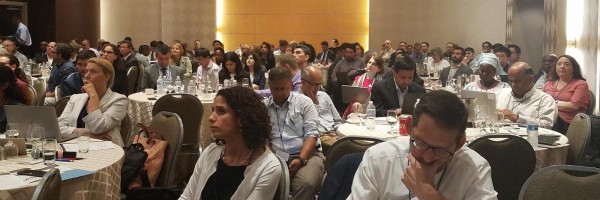NASA Harvest Conference Brings Together Voices from Across the Spectrum of Food Systems and Satellites
At the 2019 NASA Harvest Conference, held on June 25 with around 200 attendess, the Harvest Consortium introduced its high-level goals and our strategy for attaining them. The Harvest Leadership Team, keynote speakers, and panelists highlighted early achievements and impact by presenting both the remote sensing and the stakeholder/end user sides of the research-to-operations transition around using satellite data for agricultural monitoring and informing decisions. In the words of Harvest Director Dr. Inbal Becker-Reshef, “It’s a really exciting time for satellite-based agricultural monitoring - a completely new era in terms of our capabilities, revolutionizing what we can do.” Harvest and its partners seized the opportunity to increase awareness, form new connections, and strengthen existing relationships around these themes and scales.
The overarching goal of Harvest is to advance the awareness, use, and operational uptake of satellite-based Earth observations to empower decisions that support food security, stable markets, economic progress, and sustainable, resilient crop production. As NASA Administrator Jim Bridenstine put it in his opening remarks, “...because of the activities of the people in this room, lives are going to be improved, lives will be transformed, disasters that would have otherwise happened will not happen.” Harvest works both domestically and internationally, on food security and large-scale agriculture, from field to global scales, working at the intersection of Earth observation, land science, social science, and policy.
"Satellites measure snow, helping provide water resources to critical areas. This is one of the most important things NASA does - measuring and improving food security."
- NASA Administrator Jim Bridenstine
Following the Administrator's opening remarks, NASA Applied Sciences Director Lawrence Friedl provided the NASA Applied Sciences perspective, emphasizing that the Harvest Consortium’s flexibility to collaborate on short and long-term projects across many different sectors will “…help [NASA] learn effective ways to advance this usage of Earth observations.” Conference sessions also included expert insight from presenters and panelists from around the globe who spoke on the influence of Earth observation data on food security, agricultural markets, and food price volatility. Furthermore, the topics of public-private partnerships, early warning, and priorities for integrating Earth observations into agricultural policy and global food security were explored in panel discussions throughout the day.
NASA Harvest Associate Director & Manager, Alyssa Whitcraft, summed up the underlying nature of the Harvest consortium and the spirit of the conference, stating that “everyone has a role to play in promoting sustainable agriculture, feeding the planet, and promoting food security.” By facilitating collaboration and leveraging its unique programmatic flexibility, NASA Harvest along with its expansive group of partners is taking proactive steps towards increased global food security.
View the NASA Harvest Conference Wakelet to review what happened on Twitter, and visit tiny.cc/HarvestTube (the link is unavailable) to see videos from the conference!
This article originally published by the NASA Harvest Consortium
(the link is unavailable)
Published on Tue, 07/16/2019 - 13:58


